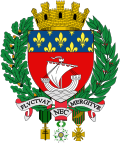Paris in the 18th century was the second-largest city in Europe, after London, with a population of about 600,000 people. The century saw the construction of Place Vendôme, the Place de la Concorde, the Champs-Élysées, the church of Les Invalides, and the Panthéon, and the founding of the Louvre Museum. Paris witnessed the end of the reign of Louis XIV, was the center stage of the Enlightenment and the French Revolution, saw the first manned flight, and was the birthplace of high fashion and the modern restaurant and bistro.


| History of Paris |
|---|
 |
| See also |
|
|